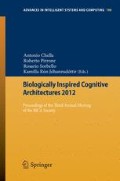Abstract
The Ambient Intelligence (AmI) research field focuses on the design of systems capable of adapting the surrounding environmental conditions so that they can match the users needs, whether those are consciously expressed or not [4][1].
In order to achieve this goal, an AmI system has to be endowed with sensory capabilities in order to monitor environment conditions and users’ behavior and with cognitive capabilities in order to obtain a full context awareness. Amy systems have to distinguish between ambiguous situations, to learn from the past experience by exploiting feedback from the users and from the environment, and to react to external stimuli by modifying both its internal state and the external state.
Access this chapter
Tax calculation will be finalised at checkout
Purchases are for personal use only
References
Aarts, E., Encarnação, J.L.: True Visions: The Emergence of Ambient Intelligence. Springer (2006)
Agostaro, F., Augello, A., Pilato, G., Vassallo, G., Gaglio, S.: A Conversational Agent Based on a Conceptual Interpretation of a Data Driven Semantic Space. In: Bandini, S., Manzoni, S. (eds.) AI*IA 2005. LNCS (LNAI), vol. 3673, pp. 381–392. Springer, Heidelberg (2005)
De Paola, A., Gaglio, S., Lo Re, G., Ortolani, M.: Sensor9k: A testbed for designing and experimenting with WSN-based ambient intelligence applications. Pervasive and Mobile Computing 8(3), 448–466 (2012)
Ducatel, K., Bogdanowicz, M., Scapolo, F., Burgelman, J.C.: Scenarios for Ambient Intelligence in 2010. Tech. Rep. Information Soc. Technol., Advisory Group (ISTAG), Inst. Prospective Technol. Studies (IPTS), Seville (2001)
Estrin, D., Girod, L., Pottie, G., Srivastava, M.: Instrumenting the world with wireless sensor networks. In: Proc. of Int. Conference on Acoustics, Speech, and Signal Processing (ICASSP 2001), Salt Lake City, Utah (2001)
Gaglio, S., Gatani, L., Lo Re, G., Urso, A.: A logical architecture for active network management. Journal of Network and Systems Management 14(1), 127–146 (2006)
Gatani, L., Lo Re, G., Ortolani, M.: Robust and efficient data gathering for wireless sensor networks. In: Proceedings of the 39th Annual Hawaii International Conference on System Sciences (HICSS 2006), vol. 9, pp. 235a–235a. IEEE (2006)
Goel, S., Imielinski, T., Passarella, A.: Using buddies to live longer in a boring world. In: Proc. IEEE PerCom Workshop, Pisa, Italy, vol. 422, pp. 342–346 (2006)
Kandel, E., Schwartz, J., Jessell, T.: Essential of Neural Science and Behavior. Appleton & Lange, New York (1995)
Author information
Authors and Affiliations
Corresponding author
Editor information
Editors and Affiliations
Rights and permissions
Copyright information
© 2013 Springer-Verlag Berlin Heidelberg
About this paper
Cite this paper
De Paola, A., Morana, M. (2013). Bio-inspired Sensory Data Aggregation. In: Chella, A., Pirrone, R., Sorbello, R., Jóhannsdóttir, K. (eds) Biologically Inspired Cognitive Architectures 2012. Advances in Intelligent Systems and Computing, vol 196. Springer, Berlin, Heidelberg. https://doi.org/10.1007/978-3-642-34274-5_63
Download citation
DOI: https://doi.org/10.1007/978-3-642-34274-5_63
Publisher Name: Springer, Berlin, Heidelberg
Print ISBN: 978-3-642-34273-8
Online ISBN: 978-3-642-34274-5
eBook Packages: EngineeringEngineering (R0)

